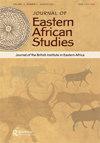When watchdogs fight back: resisting state surveillance in everyday investigative reporting practices among Zimbabwean journalists
IF 0.6
3区 社会学
Q2 AREA STUDIES
引用次数: 7
Abstract
ABSTRACT The recognition that digital surveillance is becoming ubiquitous has prompted varied responses from targeted groups. This article explores the ways through which journalists resist state-driven digital surveillance in Zimbabwe. It is based on in-depth qualitative interviews with practising journalists, sampled from the print media. The article utilises panopticon theory, which holds that victims of surveillance alter their behaviour upon the realisation of being surveilled. The interviews were subjected to thematic analysis. The article finds, among other issues, that as forms of resistance to surveillance, journalists in Zimbabwe now reduce their ‘digital footprints’ and have started to re-think the spaces in which they engage with their sources. The article argues that journalists, as a discursive community, should keep the issue of state surveillance on the mainstream agenda and maintain both organised and ad-hoc forms of resistance as ways of ‘speaking back to the state’. Conscientising the public can, possibly, provide a positive starting point for responsible, transparent and fair regulation of state surveillance practices and assist in ‘fencing off’ state intrusion in the field of journalism. In addition, journalists should push for legislation that protects their news sources.当监管机构反击:在津巴布韦记者的日常调查报道中抵制国家监控
摘要数字监控正变得无处不在,这一认识促使目标群体做出了不同的反应。本文探讨了津巴布韦记者抵制国家驱动的数字监控的方式。它基于对执业记者的深入定性采访,这些采访是从印刷媒体中取样的。这篇文章运用了全景理论,认为监视的受害者在意识到被监视后会改变自己的行为。对访谈进行了专题分析。文章发现,除其他问题外,作为对监视的抵抗形式,津巴布韦的记者现在减少了他们的“数字足迹”,并开始重新思考他们与消息来源接触的空间。文章认为,记者作为一个散漫的群体,应该将国家监控问题列入主流议程,并保持有组织和临时形式的抵抗,作为“向国家发声”的方式。公众的责任感可以为负责任、透明和公平地监管国家监控行为提供一个积极的起点,并有助于“阻止”国家在新闻领域的入侵。此外,记者应该推动立法保护他们的新闻来源。
本文章由计算机程序翻译,如有差异,请以英文原文为准。
求助全文
约1分钟内获得全文
求助全文
来源期刊

Journal of Eastern African Studies
AREA STUDIES-
CiteScore
3.30
自引率
7.10%
发文量
12
期刊介绍:
Journal of Eastern African Studies is an international publication of the British Institute in Eastern Africa, published four times each year. It aims to promote fresh scholarly enquiry on the region from within the humanities and the social sciences, and to encourage work that communicates across disciplinary boundaries. It seeks to foster inter-disciplinary analysis, strong comparative perspectives, and research employing the most significant theoretical or methodological approaches for the region.
 求助内容:
求助内容: 应助结果提醒方式:
应助结果提醒方式:


